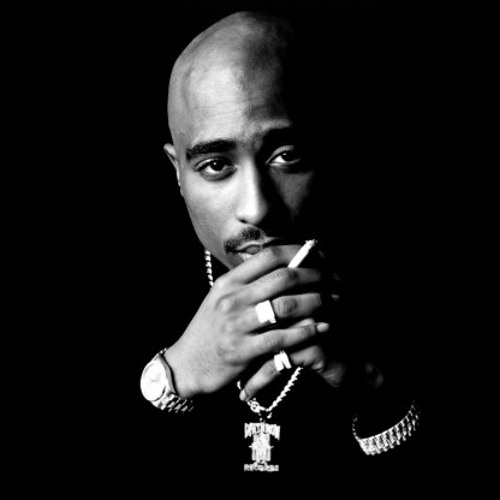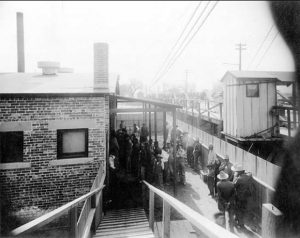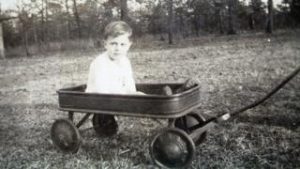Close your eyes and flashback to Harlem, New York in the 1970’s; you hear the unique dialect of thugs, pimps, and prostitutes alongside the upbeat rhythm of culture-rich music. You hear the tension of drug deals, the cries of hungry homeless children out in the cold, and the crackling of the fires of buildings being burnt down and soon to be abandoned. You hear police sirens fill the streets, and the cracking of police batons on the ribs of individuals who plead their innocence. But more importantly, you hear the silent screams of the oppressed on their last straw. Right smack in the middle of this revolutionary explosion, in 1971, was born Lesane Parish Crooks—the future Tupac Amaru Shakur.1

Tupac was born into a family that was deeply rooted in the Black Panther Party. The Black Panthers was a group of African Americans who wore iconic black outfits with black berets and emphasized “black pride.” They fiercely fought for human and civil rights, but more importantly, against police brutality. Although a social movement, they stood out from other movements of that time because, unlike other groups, they used violence to rebel. It was founded by Huey P. Newton and existed through the 1960’s-1970’s.2 His mother, Afeni Shakur, was guilty of 156 counts of crime due to her involvement with the Panther movement, and was in prison while pregnant with Tupac. Although lacking a high school degree, Afeni was incredibly smart. She was known for her public speaking, and when eight months pregnant, she acted as her own lawyer and won the case, getting her released from prison on account of a lack of evidence.3 From early in his life, Tupac lacked a father figure, and it is because of this that he was especially close to his mother and had much respect for her as a single, struggling parent. His godparents, two renowned Black Panther members, Assata Shakur and Elmer “Geronimo” Pratt, had important roles to play in the Panthers organization, so one could only imagine how developed Tupac’s sense of social awareness was from a very young age.
Growing up, Tupac automatically had a love for education. He always had the self-motivation to go to school and the instinct to pursue poetry and drama. Considering his lyrical reputation, it’s no surprise that Tupac was skillfully literate, and he soon began using this talent to say what he felt needed to be said. At fourteen years old, Shakur was enrolled in Baltimore’s School for the Arts, and it was here that he started rapping, his first real rap being about gun control.4 It didn’t take long at all for him to notice flaws in the education system and want to improve it. He later commented on how, after awhile, school became so repetitive that he stopped learning things that are actually important. For example, almost every year from Kindergarten to twelfth grade, children are required to take Math, English, and History courses of some sort, each one not being very different from the last. He felt kids lacked the opportunity to learn “important things,” such as how to complete their taxes, manage finances, and more; things, for example, that revolved around having street smarts and daily practicality. He had no hesitation taking on a leadership role, and took advantage of immediately getting involved. In high school, he started campaigns educating kids about safe sex, in a neighborhood where the rate of AIDS among teenagers was very high. He and some of his friends even wanted to restart the Black Panthers. But instead of the use of violence, his goal was to use his words to get his points across. Tupac particularly emphasized the importance of education, especially among the youth, and the importance of children being raised with the necessary mindset required for bettering the future, not only for themselves but for generations to follow. He also made it known that he absolutely hated racism, deplored the mistreatment of women, and saw both as result of ignorance.5 Tupac had never lived a luxurious life, but unfortunately, he and his family were faced with sudden financial difficulties. His mother had developed a cocaine addiction, due to her involvement with one of her ex-Panther friends. As her addiction worsened, she became unable to hold a job. This caused Tupac’s family to lose the privilege of being able to stay in one place for long. They had to keep moving, from Harlem to Baltimore, then to California, until they were eventually homeless. In 1988, at seventeen years old, Tupac was eventually forced to drop out of school and start selling drugs to pay the bills and support his family.6

Thankfully, a couple years later, in 1990, Tupac joined the HipHop group Digital Underground, and became a background dancer for them. He was also getting roles in movies, such as Ernest Dickerson’s film Juice.7 Tupac was juggling acting as well as rapping, with both really putting his name in the entertainment realm. His rap career really took off in 1991 when his first solo debut album, 2Pacalypse Now, was released.8 In this album, he raps about life in the streets for African Americans, especially in regards to police brutality, poverty, and the war on drugs. It was a real contrast to the stereotypes that rap just contained vulgarity and glamorized delinquent behavior. His frank tone and attitude immediately drew a lot of attention towards these hypersensitive topics, which were otherwise overlooked. Tupac Shakur was giving a new name to Gangsta Rap.9
2Pacalyse Now was arguably the most revolutionary compilation of Tupac’s career, because it sparked such a wide variety of emotions. In this album, not only did he identify problems of the ghetto, but he gave reasoning as to why they persisted, as well as even giving viable solutions, with his most emphasized solution being education. In his song, “Rebel of the Underground,” Shakur states,
“The most dangerous weapon: an educated black man.”10
Also in his 2Pacalypse Now album, in his song “Violent,” he talks about his blunt attitude, and his persistence to expose issues of the ghetto was being confused for violence. In this song, he states,
“They claim I’m violent just because I refuse to be silent…I will rebel against any oppressor and this is known as self defense…Unlock my brain, break the chains of your misery…My words are weapons and I’m steppin to the silent… Wakin up the masses, but you claim I’m violent.”11
Another profound piece on this album was his song “Words of Wisdom,” in which he directly speaks to those who are socially oppressed; more specifically, the African Americans of the lower class. He directly calls out problems regarding drugs, economic inequality among the classes, and how the education of kids in the ghetto is neglected. In this song, he states,
“It’s wrong to keep someone from learning something. I’m fed up, we gotta start teaching children that they can be all that they wanna be. There’s much more to life than just poverty…Conquer the enemy armed with education. Armed with the knowledge of the place we’ve been, no one will ever oppress this race again.”12
By the age of twenty years old, Tupac Shakur was not only changing a whole genre of music as we knew it, but approaching nationwide issues as no one had approached them before. He was changing the way people thought, how they looked at themselves, their place in society, and the importance of things such as education. He was doing all this through his words. Tupac once stated, “I’m not saying I’m going to rule the world or I’m going to change the world, but I guarantee that I will spark the brain that will change the world.”13 Although he died just five years after the release of his first album, his legacy still lives on today in the minds of those who wish to better the lives of the indigent youth. What do you say? Do you have the spark to change the world?
- Michael Dyson, Holler if You Hear Me (New York: Basic Civitas Books, 2001.), 6. ↵
- Encyclopedia of Activism and Social Justice, 2007, s.v. “Black Panther Party,” by Gary L. Anderson and Kathryn G. Herr. ↵
- Encyclopedia of African American History, 2010, s.v. “Shakur, Tupac,” by Aaron D. Sachs. ↵
- Encyclopedia of African American History, 2010, s.v. “Shakur, Tupac,” by Aaron D. Sachs. ↵
- Historic Films Stock Footage Archive, “Tupac Shakur 1988 High School Interview,” YouTube Video, 36:01, June 12, 2017, https://www.youtube.com/watch?v=v_XT9-C5Qu8&t=82s. ↵
- Encyclopedia of African American History 1896 to the Present, 2009, s.v. “Shakur, Tupac,” by Akil Houston. ↵
- Encyclopedia of African American History 1896 to the Present, 2009, s.v. “Shakur, Tupac,” by Akil Houston. ↵
- St. James Encyclopedia of Popular Culture, 2013, s.v. “Shakur, Tupac (1971-1996),” by Pierre-Damien Mvuyekure. ↵
- Simon Glickman, Tupac Amaru Shakur (Detroit: Gale, 2003), 26-27. ↵
- Anton Larson, “2Pac-Rebel of the Underground (lyrics on screen), YouTube Video, 3:11, May 11, 2012, https://www.youtube.com/watch?v=HKF_FZUjts4. ↵
- artfulgooner, “Tupac Violent Lyric Video,” YouTube Video, 6:27, May 6, 2013, https://www.youtube.com/watch?v=EKW3ps02L_o ↵
- 2Pac4ever, “2Pac-Words of Wisdom with lyrics,” YouTube Video, 4:54, January 7, 2016, https://www.youtube.com/watch?v=EsOVlPKyUME ↵
- EducateInspireChangeTV, “I Will Spark The Brain That Will Change The World-Tupac,” YouTube Video, 1:42, September 15, 2014, https://www.youtube.com/watch?v=uijBebYpoto. ↵



96 comments
Christopher King
When you think of or hear the name Tupac everyone goes straight to his incredible music and how he was a lyrical genius. Even though growing up he did not have the best life, he made the best life out of what he had and do what he was good at; help change the world one lyric at a time. Unlike going at changing the world how his family did with violence through the Black Panther group, he choose his music and lyrics to get his point across. One of his best known albums 2Pacalypse went against the normal rap genre by spreading knowledge of the hardships most African American men and women faced instead of bad language and bad behavior. As Tupac once said, “The most dangerous weapon: an educated black man.”
Erin Vento
I love that this article is really rooted in his life before he was a rapper, and what influences he had that made him want to make music. It’s a really good inside into a legend that made a really big impact- and continues to do so- on people (especially young people) in America. Its makes his music all the more meaningful and important.
Jonathan Perez
I loved this article because it talked about the legendary Tupac! Being a huge fan I enjoyed how the author researched the history behind Tupac’s music and how his mother’s life influenced his career. What I would have liked to see was more about his collaboration with Death Row Records and how his death was controversial even today among rap fans. However, all in all this is an excellent article and was really interesting to read.
Maria Mancha
This article about Tupac is one of my favorites. That is because it showed so many important values that Tupac expressed and how his music was an inspiration to all. Reading this article for the second time I can see and appreciate the details of Tupacs music and life. This article truly deserves to be nominated. Great job Destiny!
Timothy ODekirk
I am not usually a fan of gangsta rap and specifically of Tupac to be brutally honest. However, after reading this article, I have began to learn significantly about the famous rapper, and his motivations for his music. Tupac’s music could also be considered inspirational due to the reality of the lyrics that he wrote. Furthermore, I was also unaware before reading the article that Tupac died only 5 years after his first album was released. This explains the short-filled life that Tupac lived. This was a fantastic article, which detailed the life and motivation of Tupac, a name that will never be forgotten.
Samire Adam
Tupac Shakur is the most captivating entertainer in the rap genre. I was pleased to read an article that positively portrays him and his cause. I was impressed that the writer chose to focus on his love for education and the arts. I was unaware of his leadership role from a young age in his high school and in the African American community. One minor detail, the writer got wrong was that Assata Shakur was Tupac’s godmother; she was his aunt.
Kailan Pena
This article came straight out the gate with great imagery and good context of the times that Tupac was still around for. I personally am a huge fan of him and his work, since I grew up listening to his music. This article was very informative and helped teach me more about Tupac’s background and the message behind his words. One thing though, I kind of expected to get some insight on the few movies he did like Poetic Justice or Juice, but regardless I loved this article the whole way through.
Robert Rodriguez
Even after reading it again its an amazing article! I really like the introduction, when reading it I can almost envision it like a movie. Tupac is considerably one of the greatest and most influential rappers of all time, even in todays generation of music. While the artist did represent the “Thug Life” he speaks about many real world social issues, he wasn’t all about Drinking, Drugs, Gangs. Him being the son of a black panther he was a very intelligent and woke individual. Tupac will forever be an inspiration in the music industry and in history.
Saira Castellanos
I thought Tupacs music was just like almost all other rappers, just talking about drugs, sex, amd partying. I guess thats why its called educating ignorance. I shouldnt have just assumed his music is bad. Its kind of refreshing to know that he wanted to change the world with his music, which is something i had no idea about. I did not really understand why he was such a memorable rapper to the world until now, he didnt just rap about the stupid things, he rapped out the truth about society, and it makes me happy that Logic is not the only widely known rapper that raps about good things.
Destiny Leonard
This was such a great article. Prior to reading this article I never knew Tupac’s background. It was so interesting to see how his family was involved in the Black Panther movement, and how that influenced his music as well as his devotion to social change. The way that the author described the events which took place was very well done. overall great work!